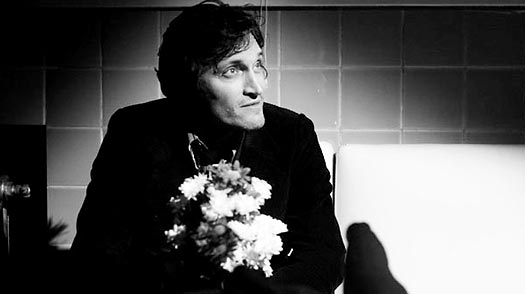
Vincent Gallo in Francis Ford Coppola's Tetro
(2 of 2)
You'll hear clear echoes of the Godfather films, for which Coppola, who knew nothing about real gangsters, said he appropriated much of his own family dynamic, the scenes of eating and arguing. There are also hints of another 1974 classic, Chinatown, in the family mystery peeled layer by layer. And like Youth Without Youth, the new film boasts an exceptionally sensitive performance by a young actor — here Ehrenreich, who looks like a missing Sheen brother and plays the callow Bennie as if innocence and ignorance were the coolest qualities a teenager could possess.
But Gallo, who starred in and directed the legendary Cannes atrocity The Brown Bunny six years ago, is an actor who's all brooding surfaces and no depth. He can't touch whatever primal pain Coppola wants Tetro to conceal and then reveal. Nor has Coppola filled out the canvas with telling incidents, or characters that go much beyond caricature. Sitting through the two-plus hours of Tetro can be an ordeal.
Still, the film, which uses the same team Coppola found for the much more daring and romantic Youth Without Youth, looks great. After hundreds of movies and TV shows shot in the shaky-cam style, it's a blessing to find one where the camera is on a tripod — and, Coppola notes, never moves. That gives Tetro the stateliness of silent films, just as the use of glistening or sepulchral black-and-white brings some of the glamour of classic Hollywood. But Coppola fans want him to recapture the dramatic coherence and operatic grandeur of his most productive decade. The movie plays not like an old man's film but like a promising, frustrating student effort.
Coppola has said he was inspired by the semi-autobiographical works of Eugene O'Neill and Tennessee Williams. (One of his first screenwriting credits was on the 1966 film version of Williams' This Property Is Condemned.) For those aware of the filmmaker's family history, Tetro's backstory has its provocative echoes. Coppola's own father, Carmine, was a flautist for the NBC Symphony Orchestra who left regular work to pursue his ambitions as a composer; later he wrote the score for several of Francis's films. Carmine's brother Anton was, for much of their careers, the more renowned of the two: the composer of a violin concerto and the opera Sacco and Vanzetti. He married and divorced a dancer, then married another dancer. So it would seem that in Tetro the father and uncle roles are switched, and revenge is a dish best served 50 years late.
At the post-screening Q&A, Coppola said of the similarities between life and script: "Nothing like this happened, and everything is true." Alas, in Tetro he has made a movie where plenty happens but nothing rings true.